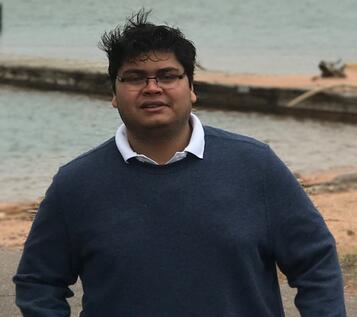Research Experience:
Center for Turbulence Research, Department of Mechanical Engineering, Stanford University, CA
- Postdoctoral Fellow [Aug 2021 - Ongoing]
Project supervisors: Prof. Ali Mani
Department of Mechanical Engineering and Department of Mathematics, Iowa State University, Ames, Iowa
- Graduate Research/Teaching Assistant [Aug 2016 – Aug 2021]
Project supervisors: Prof. Baskar Ganapathysubramanian and Prof. James Rossmanith
Title: Energy-Stable Finite Element Methods for the Simulation of Two-Phase flows using Cahn-Hilliard Navier-Stokes Equations.- Developed energy stable numerical methods for two-phase flows with deformable interfaces using coupled thermodynamically consistent Navier-Stokes and Cahn Hilliard Equations (CHNS).
- Deployed the CHNS numerical model on a massively parallel adaptive meshing framework Dendro
Synthetik Applied Technologies, Austin, Texas
- Research and Development Engineer [August ‘20 – December ‘20]
Title: Numerical Simulations of highly energetic compressible flows using discontinuous Galerkin methods.- Develop discontinuous Galerkin Finite Element Methods for the simulation of highly energetic compressible flows.
- Deploy the aforementioned methods in a parallel C++ library using mfem library as a backend.
Cain Department of Chemical Engineering, Baton Rouge, Louisiana
- Research Associate [Nov ‘15 – May ‘16]
Project supervisors: Prof. Krishnaswamy Nandakumar
Title: Energy transfer mechanisms in multi-phase flows- Investigated energy transfer mechanisms by analyzing triad interactions using helical mode decomposition in multiphase flows.
- Developed a mathematical framework for quantifying energy transfers between length scales of turbulent multiphase flows.
CSIR-National Chemical Laboratory, Pune, MH, India
- Research fellow [May ‘13 – Oct ‘14]
Project supervisors: Dr. V. Ravi Kumar, Dr. B. D. Kulkarni
Title: Investigations of relationships between spatial and temporal behaviour of multi-phase turbulent systems using wavelet transforms- Developed correlations between spatial and temporal behaviour of chemical process equipment, based on energy transfer mechanisms in spatial and temporal velocity data.
- Verified the methodology using synthetic turbulent signals and images generated using infinitely divisible cascades.
Institute of Chemical Technology, Mumbai, MH, India
-
Final year project – Department of Chemical Engineering [Dec ‘14 – May ‘15]
Project supervisors: Dr. Channamallikarjun S. Mathpati, Dr. Ashwin W. Patwardhan
Title: Simultaneous PIV-PLIF measurements of Marangoni convection for the case of drop rising in a channel- Performed high-fidelity experiments to measure velocities and concentrations in Marangoni flows using simultaneous Particle Image Velocimetry (PIV) and Planar Laser Induced Flourenscence (PLIF).
- Used Wavelet transforms based methodologies to quantify local mass transfer coefficients.
-
Undergraduate student researcher – Department of Chemical Engineering Project supervisors: Dr. Channamallikarjun S. Mathpati, Dr. Ashwin W. Patwardhan
Title: Heat transfer characteristics in turbulent boundary layers of pipe flows- Performed energy coupled large eddy simulations of turbulent pipe flows to obtain velocity and temperature statistics in the boundary layers.
- Designed a methodology to obtain precise energy flux balances from large data obtained from the simulations.
- Obtained precise energy balances in the boundary layers to aid in design for cooling systems which use high temperature coolants.
Teaching Experience:
Department of Mechanical Engineering, Iowa State University, Ames, Iowa
(Won Teaching Excellence Award for this work)
-
Fall 2018: Graduate Teaching Assistant [August ‘18 – December ‘18]
Course Instructor: Prof. Shankar Subramaniam
Course: ME 436 Heat Transfer- Developed and delivered recitation sessions.
- Conducted problem solving session tailored to student feedback.
-
Spring 2019: Graduate Teaching Assistant [January ‘19 – May ‘19]
Course Instructor: Prof. Travis R. Sippel
Course: ME 436 Heat Transfer- Conducted problem solving session tailored to student feedback.
- Graded exams and homework.
-
Spring 2020: Graduate Teaching Assistant [January ‘20 – May ‘20]
Course Instructor: Prof. Travis R. Sippel and Prof. Theodore Heindel
Course: ME 436 Heat Transfer- Graded exams and homework and conducted feedback sessions.
